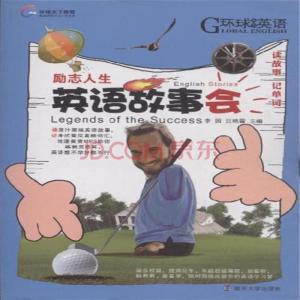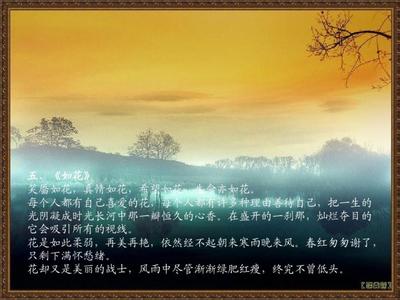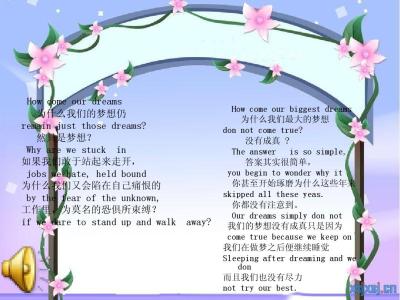不够洒脱,但这就是人生。不够豁达,但这就是人生。不够励志也不够美好,但这就是人生啊。本文是关于励志的英语故事,希望对大家有帮助!
关于励志的英语故事:人生也有歧路
In 1899, when Einstein studied at the Swiss Federal University of Technology in Zurich, his tlltor was Minkevsky, a mathematician.
1899年,爱因斯坦在瑞士苏黎世联邦理工大学就读时,他的导师是数学家明可夫斯基。
Once Einstein asked Minkevsky, "How can a person, like me, leave his distinct footprints on the road of life and make an outstanding contribution in the scientific field?" It was a "sophisticated" problem. Minkevsky said that he had to think about it better and then gave him an answer.
有一次,爱因斯坦问明可夫斯基:“一个人,比如我吧,究竟怎样才能在科学领域、在人生道路上,留下自己的问光足迹、做出自己的杰出贡献呢?”这是个“尖锐”的问题,明可夫斯基说他要好好想一下再给他答案。
Three days later, Minkevsky told Einstein that the answer was coming! He pulled Einstein to walk toward a building site and straight set foot on the cement ground that the construction workers had just paved.
三天后,明可夫斯基告诉爱因斯坦说有答案了!他拉着爱因斯坦朝一处建筑工地走去,而且径直踏上了建筑工人刚刚铺好的水泥地。
In the workers' scolding, Einstein was confused to ask Minkevsky,"Sir, don't you lead me astray?"
在建筑工人的呵斥声中,爱因斯坦被弄的一头雾水,不解的问明可夫斯基:“老师,您这不是在误导我?”
"Right, exactly!" Minkevsky said. "Have you seen it? Only the old road surface that have long solidified and on those place that have been passed by countless steps, you cannot tread out your footprint.
“对,就是这样!”明可夫斯基说。 “看到了吧?只有尚未凝固的水泥面,才能留下深深的足迹。那些凝固很久的老路面,那些被无数脚步走过的地方,你别想再踩出脚印。”
Hearing that, Einstein thought long and nodded significantly, Since then, a very strong sense of innovation and pioneering consciousness began dominating Einstein's thinking and action. He said, "I never memorize and reflect what dictionaries and manuals carry, for my brain only memorize those things that are not included in books." It was such a reason that Einstein left his deep sparkling footprints in the history of science.
听到这里,爱因斯坦沉思了良久,意味深长地点了点头。从此,一种强力的创新和开拓意识,开始主导着爱因斯坦的思维和行动,他说:“我从不记忆和思考词典、手册里的东西,我的脑袋只用来记忆和思考那些还没载入书本的东西。”正因如此,爱因斯坦才在科学史上留下了深深的、闪光的足迹。
关于励志的英语故事:安德鲁·卡内基和他的慈善事业
Carnegie spent almost twenty years left to him giving his wealth away. He believed that those who became rich should return what they did not need to society. He had said that a rich man "dies disgraced" if he does not use the ability he has shown ingathering money to give away his money for the public good during his lifetime.
卡内基花了将近二十年的晚年岁月来分散自己的财富。他认为那些发了财的人应该把他们不需要的钱都归还给社会。他曾经说过,一个富人在他活着的时候不把他在积累财富上所显示的才能用来为公共利益,将他的钱财分散出去的话,他死也“死得不光彩”。
He began to use his money to build free public libraries. In 1919 it was said that his money had built almost 3,000 libraries, valued altogether at over sixty million dollars. Most of these were in the United States, but some of them were in Canada, Great Britain, New Zealand, and even as far as the Fiji Islands.
他开始把他的钱用来兴建免费的公共图书馆。1919年,据说他的钱已经兴建了差不多三千座图书馆,总共估价大约六千万美元以上。这些图书馆大多数都在美国,但其中一部分在加拿大、英国、新西兰,甚至远在斐济群岛。
A gift of four million dollars was made to Carnegie's hometown, Dunfermline, Scotland. It was used to build parks and playgrounds for the people of the town. Pittsburgh, where he made his fortune, was given a music hall, a museum, an art gallery, and a public library.

一份四百万美元的馈赠被送给了卡内基的故乡苏格兰邓费尔姆林。那笔款是用来为该镇人民修建公园和运动场的。匹兹堡是他发边的地方,他为该市兴建了一座音乐厅、一个博物馆、一个美术馆和一座公共图书馆。
Andrew Carnegie's public gifts amounted to almost three hundred and thirty million dollars. He gave one million, five hundred thousand dollars to the Peace Palace at the Hague in the Netherlands. After the war began in Europe in 1914, he gave his home, Skibo Castle in Scotland, to the British Government for use as an army hospital.
安德鲁·卡内基的热心公益的馈赠达到三亿三千万美元左右。他赠给荷兰海牙和平官一百五十万美元。1914年战争在欧洲爆发后,他把自己在苏格兰斯基波城堡的住宅赠给英国政府用作陆军医院。
关于励志的英语故事:成吉思汗
The name Genghis Khan probably makes many people think of conquering warriors on horseback leaving burning cities and piles of dead bodies behind them. While there is no doubt that Genghis Khan was the leader of a highly efficient killing machine, there was much more to him than military skill. He was also a talented politician with excellent diplomatic abilities.
成吉思汗之名可能会使许多人想起征伐税勇策马扬鞭,在他身后只留下焚毁的家园与遍野堆积的尸骸。无疑,成吉思汗率领着一支高效率杀戮机器般的军队,除了军事才能,他还有更多值得注目的地方。他也是位有杰出外交能力的优秀政治家。
In the 1160s, the tribes of the Central Asian steppes were almost constantly at war with one another. In the middle of the chaos, one of the tribal leaders had a son named Temujin. When the boy was nine years old, his father was poisoned by enemies. The tribe then abandoned the family, leaving them to survive by eating rats and insects.
12世纪60年代,中亚大草原的部落长年征战不休。在混乱之中,其中一个部落的首领有个儿子,名叫铁木真。在他九岁时,父亲被敌人毒害。于是该部落抛弃了这家人,他们只好靠吃老鼠与虫子才勉强度日。
Despite his difficult chi1dhood, Temujin grew up strong enough to claim his hereditary position as tribal leader. He became adept at forming alliances, as well as fighting battles. By 1206, all the Mongol tribes were ready to recognize him as supreme leader. They gave him the title Genghis Khan, which means "emperor of all emperors."
尽管童年生活很艰苦,长大后的铁木真却英勇善战,并成功夺回部落首领的世袭地位。他擅长与其他部落结盟,并精通打仗。到1206年,蒙古各部落都愿意认定他为最高统帅。他们赋予他成吉思汗的称号,意即“王中王”。
Having united the tribes of Central Asia, Genghis Khan turned his attention elsewhere. His ambition was world conquest, and he advanced at an astonishing rate. By the time of his death in 1227, he had created an empire that stretched from the Pacific coast to the Caspian Sea.
一统中亚各部落后,成吉思汗将注意力转移它处。他的雄心壮志是征服全世界,而他也以惊人的速度向目标挺进。成吉思汗于1227年逝世,到那时他已经建立了一个东起太平洋海岸西至里海的帝国。
 爱华网
爱华网



